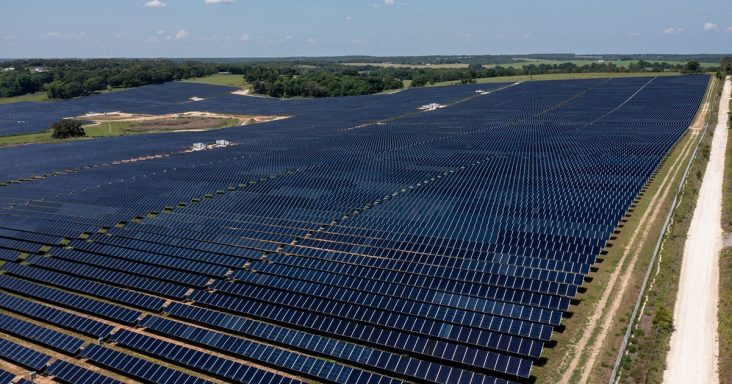New solar arrays underway, operational throughout state
by June 20, 2022 1:09 pm 2,452 views

In Woodruff County, Little Rock-based Arkansas Electric Cooperative Corp. (AECC) recently started construction on a 122-megawatt solar array adjacent to the site of a former 122-megawatt natural gas plant.
Multiple solar farms and advanced energy projects are underway or have been completed recently in Arkansas.
In Woodruff County, Little Rock-based Arkansas Electric Cooperative Corp. (AECC) recently started construction on a 122-megawatt solar array adjacent to the site of a former 122-megawatt natural gas plant. An AECC spokesman said the Carl Bailey Generation Station in Augusta suspended operations in July 2020 but has yet to be retired. A retirement date has not been set.
Construction on the Woodruff County Solar facility started in May and is expected to begin operating in July 2023.
“AECC and our member cooperatives support all types of wholesale power generation resources, such as affordable, non-fossil resources like solar,” said Buddy Hasten, president/CEO of AECC. “As part of our long-range planning, the Woodruff County Solar project fits our need for additional capacity for our member cooperatives. The intermittent energy produced by this facility will supplement our mission-critical baseload generation resources.”
Scottsdale, Ariz.-based renewable energy company Depcom Power will design and build the array on 639 acres.
“We are proud to have been selected to construct the facility for the Arkansas Electric Cooperative Corp.,” said Tony Perrino, chief operating officer for Depcom Power. “As we build the plant over the next year we look forward to supporting the local community, providing jobs and hiring local services. Social stewardship and delivering reliable solar energy remain at the forefront of our commitment to Arkansas.”
In Saline County, a 667-kilowatt solar array recently started operating and will meet most of the electricity demand for Saline County Detention Center.
The array comprises 1,482 panels on about 3 acres adjacent to the detention center on Neeley Street. The project also includes arrays mounted on the roof of the detention center and several other county buildings. Combined, the arrays are expected to offset 1.6 million kilowatt-hours of electric demand by the county and save in utility costs resulting in a guaranteed 20-year payback on the investment.
Saline County invested about $6 million in the project that also includes system upgrades throughout various county properties such as LED lighting, water conservation measures, HVAC systems and energy management controls.
“It is exciting to see the detention center solar array, as it reflects the vision of our quorum court to reduce Saline County’s energy costs,” said County Judge Jeff Arey. “In addition to the cost savings, this project also demonstrates Saline County’s commitment to pursuing opportunities for innovation and leadership.”
Saline County hired Ireland-based energy services company Johnson Controls Inc. for the project.
“Johnson Controls is proud and thankful to be involved in this project to ensure decades of cost savings to the county,” said Alex Ray, business development director for Johnson Controls in Arkansas. “This project delivers strong economic return for our tax dollars, millions in needed facility improvements and a cleaner environment.”
In Harrison, a 1.1-megawatt DC solar array was completed for Ozark Mountain Regional Public Water Authority. The utility provides water to more than 20,000 customers in Boone, Marion, Newton, Searcy, Johnson and Pope counties.
Little Rock-based solar energy company Scenic Hill Solar built, owns and operates the more than 2,500-panel array on company-owned land. Ozark Mountain Regional Public Water Authority will purchase the electricity the array generates and has a 28-year agreement with Scenic Hill Solar.
“Scenic Hill Solar is proud to partner with forward-thinking leaders like Chairman (Andy) Anderson and the Ozark Mountain Water Board of Directors,” said Bill Halter, CEO of Scenic Hill Solar. “This project will concurrently provide electricity savings to the utility, improve the environment, provide $2 million in local economic development and attract environmentally conscious business to the local area.”
The array is expected to produce more than 1.6 million kilowatt-hours of electricity annually.
“Ozark Mountain Regional Public Water Authority is excited for the completion of this power plant, marking a new chapter for both us and our customers,” said utility chairman Andy Anderson. “We have always been committed to providing supplies of safe and plentiful water to the north-central region of Arkansas. This project aligns with that commitment by reaping the benefits of a renewable energy source and improving our environment while saving money for the water utility.”
In Northwest Arkansas, North Little Rock-based solar energy company Seal Solar recently installed four electric vehicle chargers at the Washington County Courthouse in downtown Fayetteville.
The chargers at 280 N. College Ave. are open to the public and provide about 35 miles of range per hour of charging using a 240-volt output.
“Washington County partnered with Seal Solar and is pleased to offer its citizens the ability to charge their electric vehicles while they are at the courthouse in downtown Fayetteville,” said Dwight Gonzales, building and grounds director of Washington County. “Washington County is powered by 2 megawatts of solar energy, and now citizens can charge their vehicles using the power of the sun.”
According to a news release, the county paid for the project with money from the Arkansas Department of Environmental Quality Level 2 Rebate Program and is expected to receive about $22,000 for this project. The county also is expected to receive about $2,000 from the Southwestern Electric Power Co.’s electric vehicle charger incentive program.
“Expanding the adoption of electric vehicles and charging infrastructure go hand in hand,” said Chris Flores, electric vehicle charger product manager at Seal Solar. “It is crucial that we continue to make EV charging more accessible in all parts of Arkansas to make the transition to electric mobility equitable and economical.”
